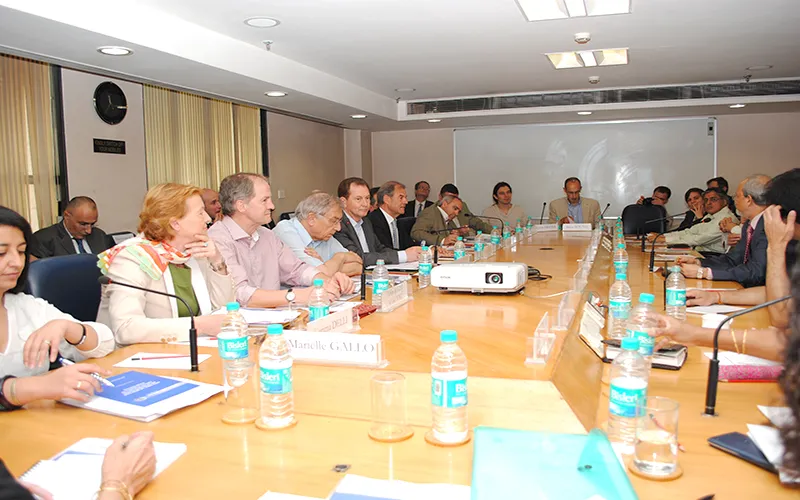-
CENTRES
Progammes & Centres
Location
During a roundtable with a delegation of EU Members of Parliament, the ORF Director pointed out the great chance the international community has today in setting up electricity generating plants in India with green technology.

A delegation of 20 Members of the European Union Parliament participated in a roundtable exchange of views at Observer Research Foundation on April 30, 2012. The delegation was led by Sir Graham Watson, Chairman of the EU Parliament’s Delegation for Relations with India.
The meeting, jointly chaired by the ORF Director, Mr. Sunjoy Joshi, and Sir Graham Watson, discussed the EU-India Free Trade Agreement (FTA), climate change, energy security as well as many other issues. The members showed special interest in the future agenda and definition of the BRICS group.
The EU delegation was on a four-day trip to India, visiting Delhi and Chennai.
ORF vice president, Mr Samir Saran, and ORF Distinguished Fellow, Amb. H H S Viswanathan, made presentations on the BRICS group. They emphasised that while the group obviously is different from the traditional international alliances of countries, which were defined by either a geographical or ideological glue, it should not be underestimated in its capacity to assist in mastering the challenges these emerging economies share.
Amb. Viswanathanand Mr. Samir Saran said a BRICS development bank and stock exchange, for example, will be invaluable in facilitating intra-BRICS trade and thus the development of robust commodity markets and exchange rates among the BRICS currencies that are no longer tied to the financial centres in New York and Frankfurt.
The President of the ORF Centre for International Relations, Amb. M Rasgotra, pointed out that BRICS is not directed against any country or group, but, much like the OECD in the 1960s, sees its raison-détre in managing conflicts and facilitating greater cooperation among the group’s members.
Mr. Sunjoy Joshi, who is also an energy expert, and Ms. Lydia Powell, Head, ORF Centre for Resource Management, gave an overview over India’s challenges in the energy sector, which is a defining factor in its position in international climate change negotiations.
Mr. Joshi pointed out to the EU delegation that the great chance for India and the international community today is that, unlike China, where majority of the electricity generating plants for the coming 30 years are in place, India is still to put these up in the next 10 years. He therefore urged the delegation to seize this opportunity and help India in implementing and financing the best and greenest energy technologies.
On the downside, one of the issues that, in the discussions on energy and climate change, stood out as a major source of continued friction in the India-EU relations is the EU’s insistence on an international Emission Trading Scheme. As such a scheme for India would work much like EU import tariffs had in the past, "we will not walk away from the table, but we are in for a good fight there," said Mr. Samir Saran to the question raised by Mr. Peter van Dalen, Vice Chairman of the delegation. ORF Senior Fellow Dr. Jayshree Sengupta and Mr. M.K.Venu, Managing Editor of the Financial Express, addressed some of the sticking points still existing in the negotiations of a FTA between the EU and India, which is yet to be finalized after four years of negotiations.
Dr. Jayshree Sengupta underlined the lack of transparency in the disclosure of information on the negotiations, especially on the part of the Indian government. She said there is a need for a more flexible approach on the part of the EU on some difficult tariff issues as India need to protect some of its economic sectors.
(This report is prepared by Antje Uhlig, Observer Research Foundation)
The views expressed above belong to the author(s). ORF research and analyses now available on Telegram! Click here to access our curated content — blogs, longforms and interviews.